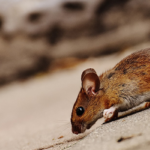
Many people don’t think they need pest control services during the winter. Don’t the ice, snow, and freezing temperatures either send creepy crawlers south or kill them off? Nope—certainly not all of them. Mice, rats, cockroaches, and Asian beetles are some of the common pests that can sneak into our homes and make themselves comfortable (sometimes without us even noticing) during the cold season in Iowa.
How Pests Can Enter Your Attic
Pests can sneak into your attic through cracks or holes in your roofing system, gutters, your home’s foundation, or where wood is beginning to rot. The best way to keep pests out of your home is by repairing any damaged areas and making sure your home is sealed tightly so nothing, even small insects, can crawl inside.
Why Attic Pests Can Be a Problem
Pests can create nests in your attic and quickly grow to large numbers, turning into a large infestation before you know it. Rodents can chew through electrical wires, posing fire hazards, and destroy insulation, leaving your home vulnerable to the elements. They can also contaminate your home and spread serious diseases, such as salmonella, hantavirus pulmonary syndrome, and rat-bite fever. Keep in mind that some diseases can be spread in ways other than being directly bit or scratched. In some cases, simply breathing in or touching contaminated dust can be enough to infect you.
Have a pest problem? We can help!
How to Tell If Pests Are Lurking in Your Attic
If you hear any kind of noise coming from your attic, it’s probably not a ghost. You likely have a pest problem, and by the time you notice the noise, unfortunately, the problem could be a large one. Like we mentioned above, rodents can spread some diseases through the air, so it’s best to let a professional enter your attic and treat the problem if you know you have one. Even if you don’t breathe in toxic dust by going into your attic, you could track contaminants into your living space.
If you decide to enter your attic, look for chewing marks, listen for noises, and keep an eye out for nests and droppings. Be sure to check floor cavities, window fixtures, insulation, wood, and other less obvious areas for signs of life.
How to Treat an Attic Pest Problem
If you’ve heard pitter-pattering above your head or you believe you may have an insect infestation up there (or you want to ensure you don’t), have your top-level treated this winter. A professional exterminator will inspect your home and treat it appropriately. This may including pinpointing and sealing any entry or exit points, applying insecticides, dusting hard-to-reach areas, vacuuming, setting traps and bait stations, and installing pest monitors.
Call Springer!
If you’d like your home professionally inspected and treated, regardless of the time of year, contact Springer. You can learn about our process on our Residential Pest Control page. Call, text, or email us anytime!
Should I Treat My Attic for Pests This Winter in Des Moines?
Serving Central Iowa since 1989





